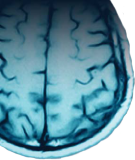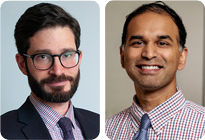



Autoimmune Neurology and Neuroinflammatory Diseases Fellowship
Massachusetts General Hospital and Harvard Medical School
Program Directors:
Drs. Haatem Reda and Shamik BhattacharyyaThis 1-year program provides extensive clinical experience, training, and research mentorship to prepare fellows for leading-edge clinical and/or research careers in autoimmune neurology and neuroinflammatory diseases at academic centers or in industry. Fellows will acquire knowledge, skills, and expertise in the diagnosis and management of complex diseases seen at two large tertiary care centers—Massachusetts General Hospital and Brigham and Women’s Hospital—including the full spectrum of autoimmune neurologic and neuroinflammatory diseases of the central and peripheral nervous systems. Fellows will receive mentorship from faculty engaged in clinical research and will be encouraged to participate in primary and/or secondary investigations leading to publication. An optional second year provides dedicated time and mentorship for clinical and translational research.
Program Structure
Continuity clinics: The core outpatient experience is the continuity clinic where fellows will assume the role of primary neurologist responsible for investigating, diagnosing, and managing complex autoimmune and neuroinflammatory neurologic diseases as well as coordinating care and follow-up for patients. These are 3 half-day clinic sessions per week throughout the year directly supervised by faculty in the division of neuroimmunology.
Subspecialty clinics: Fellows will spend 1 half-day weekly, in 3-month blocks, in various subspecialty clinics relevant to the aims of the training program, supervised by faculty in the division of neuroimmunology, in other divisions in the department of neurology, and in some cases other departments:
- Multiple sclerosis and other CNS demyelinating diseases: Fellows will be introduced to the diagnosis and management of the various forms of multiple sclerosis, NMO-spectrum disorder, MOG-associated disease, and other CNS demyelinating diseases, including the selection of disease-modifying therapies.
- Neuroinfectious diseases: Under the supervision of faculty with subspecialty expertise in neuro-infectious diseases, fellows will evaluate and treat a wide range of neurological syndromes associated with HIV infection in all its stages and severities as well as viral and fungal encephalitides, syphilis, cysticercosis, Lyme disease, etc.
- Neuro-ophthalmology and skull base inflammatory diseases: These clinics offer experience in the finer aspects of neuro-ophthalmology under the supervision of Dr. Bart Chwalisz with emphasis on the evaluation and management of neuro-ophthalmologic and skull base inflammatory disorders.
- Neurorheumatology: This experience, under expert rheumatology faculty supervision, gives fellows a fuller picture of the diagnosis and management of diseases such as SLE, systemic vasculitides, IgG4-related disease, Behçet disease, etc, many of which have interesting neurological implications and complications. Moreover, core therapies we use for patients in autoimmune neurological diseases are borrowed and adapted from advances in the care of rheumatologic diseases. Many of the fellows’ continuity clinic patients are co-managed with our rheumatologist colleagues.
- Ataxia (including autoimmune cerebellar diseases): Founded in 1993 by master clinician Dr. Jeremy Schmahmann, this clinic gives fellows a unique and extraordinary opportunity to see patients with multisystem neurological disorders including autoimmune and inflammatory cerebellar disorders under the tutelage of Dr. Schmahmann.
Inpatient consultations: Fellows will take call responding to non-urgent requests for subspecialty consultations from inpatient neurology teams under the supervision of fellowship faculty with relevant subspecialty experience.
Optional research year: Fellows may opt to complete a second-year research extension during which they will spend up to 20% of their time in a subspecialty clinic relevant to their area of research.
Research Mentorship
First-year fellows will receive mentorship from fellowship faculty engaged in clinical and translational research and will be encouraged to participate in primary and/or secondary investigation leading to publication. Fellows in the optional second-year research extension will receive 1:1 mentorship and training from fellowship and other division faculty engaged in clinical and translational research and will be expected to develop and implement at least 1 investigational protocol leading to publication.
Educational Program
The academic year will start with a foundational didactic curriculum over the summer covering basic neuroimmunology. These weekly sessions will then give way to more subspecialized didactic sessions for the remainder of the year covering the breadth of neuroinflammatory diseases including neuro-infectious diseases by fellowship faculty as well as invited expert faculty from MGB and elsewhere.
Fellows participate in weekly division case conferences to present and discuss recent cases of interest with fellowship faculty. Fellows will also present challenging imaging cases at a weekly neuroradiology conference with our neuroradiologist colleagues.
During the neuroinfectious diseases block, fellows will present at monthly neuro-ID journal club conferences. During the ataxia clinic block, fellows will attend and occasionally present cases at the weekly Ataxia Unit case conferences. Fellows will present relevant cases at quarterly neurorheumatology case conferences (a shared conference with the division of Rheumatology).
Fellowship Faculty
| Haatem Reda, MD |
Program director |
| Shamik Bhattacharyya, MD |
Associate program director; Research mentor |
| Nagagopal Venna, MD |
Faculty mentor |
| Michael Levy, MD, PhD |
Faculty mentor; Research mentor |
| Tanuja Chitnis, MD |
Division chief; Research mentor |
| Denis Balaban, MD |
Faculty mentor |
| Shibani Mukerji, MD, PhD |
Faculty mentor |
| G. Kyle Harrold, MD |
Faculty mentor |
Application and Requirements
Fellows should have completed an accredited neurology residency training program and demonstrate an interest in autoimmune neurology and neuroinflammatory diseases as well as a career in academic neurology.
Interested candidates should send a letter of intent and CV as well as at least 3 letters of recommendation to our Program Coordinator, Ms. Altrecia Henry (aehenry@mgb.org).
Contact
Haatem Reda, MD, Program director: hreda@mgb.org
Altercia Henry, Program coordinator: aehenry@mgb.org
Visit the Autoimmune Neurology and Neuroinflammatory Diseases Fellowship for further information.
